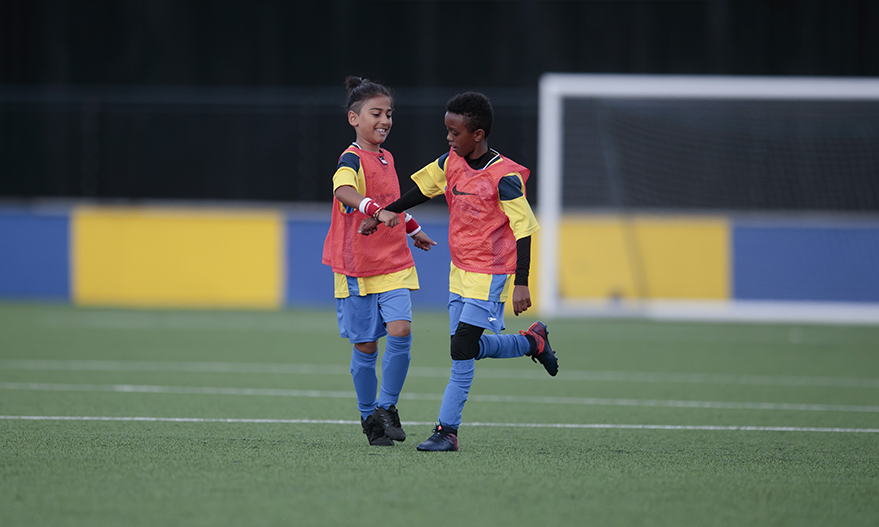
Developing socially skilled children in the Foundation Phase
- The Boot Room
- 31 July 2020
The Foundation Phase puts a lot of emphasis on individual technique and ability on the ball. But, as players get older, teamwork, cooperation and togetherness become increasingly important.
When considering this development, the social corner of The FA 4 Corner Model is key. It underpins the building of positive relationships and the creation of the ‘right’ environment. We want to help support children to become:
Well behaved
They can focus appropriately during training and games and are aware of how their behaviour might impact upon others.
Good learners
They can recognise the importance of learning new things and are developing a range of strategies to develop their understanding and knowledge.
Able to recognise the importance of the team
This ability will vary across players in the Foundation Phase. Some will already have an appreciation, whilst for others it will still be mainly about them and their needs.
Able to manage relationships effectively
Again, young children will vary widely in their ability to do this. However, this capacity can be improved and developed in all children – and the Foundation Phase is a great place to start.
Independent
Being given more ownership, choice and responsibility is not easy, but if we’re to develop independent decision-makers on the football pitch, then developing this trait in all our young children is a good place to begin.
So, how do we make a start?
Learning works best when there are clear expectations of all those involved. To help, your club or team could draw up (and agree) guidelines that become the framework for all behaviour in training and games.
If you’re having issues with learning or behaviour, particularly poor behaviour, try talking to your team about how safety, learning and respect should influence how we treat others.
- If what you’re doing puts someone’s safety at risk – don’t do it.
- If your behaviour is negatively affecting the learning of others – don’t do it.
- If what you’re saying or doing is disrespectful – don’t do it.
These three ‘ground rules’ can help shape a positive environment and – because there are only three of them – they are easily understood, reinforced and remembered.

Players who feel they're in a safe and secure environment will develop more effectively
Learning is done most effectively in a social, interactive way
It shouldn’t be a one-way street. Involving the players in their development and learning can be very rewarding and coaches should aim to work this way in the Foundation Phase and, in fact, with players of any age.
Try to make your team’s learning interactive, experiential (let the players explore and experiment rather than just tell them) and shared with others in a meaningful context (it should be connected to the game of football where possible). This will help to create an effective learning environment.
Learning is great when facilitated by adults and when initiated by the players. The phrase ‘let the game be the teacher’ is often misinterpreted as ‘throw a ball in, walk away and the players will develop on their own’. This is rarely true, but it does raise two important points.
The first point is that coaches should allow time for play with little or no adult involvement. These player-led, informal and unstructured games can provide rich learning opportunities. If your players do a lot of ‘street football’ or futsal during their own time, fitting this into your sessions may not be a priority. If they don’t do any, you might want to provide at least some opportunities to play this kind of game. Such activities provide good opportunity for social development, e.g. players having to enforce the rules and deal with disagreements between themselves.
The second point is that player-led activities should be balanced with sessions and games where the coach observes. During these periods, it’s your job to look for opportunities to extend the learning for individual players.

A good learning environment will include opportunities for both of these things and the decision for coaches and teams is how much time is allocated for each one
Setting clear expectations and boundaries establishes the framework from which relationships can be formed and learning can take place. If you want to read further, the theoretical model behind this is called ‘social constructivism’, which is underpinned by ‘attachment theory’.
Applying this model to coaching is relatively new, but if you work in the social corner you’re trying to develop children who are effective and life-long learners, socially skilled and able to form positive relationships with a variety of people.
To learn more about how to do this, take a look at work by Burr, Gergen, Vygotsky, Bowlby, Ainsworth and Hughes (amongst others).
To learn more about Foundation Phase DNA, click here.


